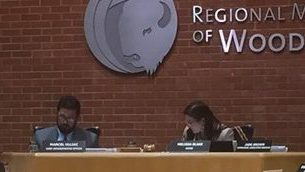Council meets one hour early Tuesday night to tackle another heavy agenda. The meeting will begin at 5:00 at Jubilee Centre.
The agenda kicks off with a look at the spending and revenue plan for the year. The RMWB’s Chief Financial Officer, Elsie Hutton, will give a presentation on the 2016 Fiscal Management Strategy which is being presented as information and guidance as Council considers the 2016 Property Tax Rate Bylaw.
Administration will also present the proposed 2016 Property Tax Rate Bylaw which has to be passed annually to allow work set out in the approved Operating and Capital Budgets to be completed. Council has already approved eliminating late fees for property taxes up to December 31, 2016.
These first two items were supposed to be heard last week but was put off as the meeting was already pushing toward midnight with multiple additional items on that agenda.
Among those additional items were the first readings of three by-laws, all three of which will have their public hearings and second and third readings Tuesday evening.
The first will look at changing the noise by-law to allow work 24/7 during the cleanup period. Normally, construction noise isn’t allowed between 11 p.m. and 7 a.m. but this change will allow it in any of the areas affected by the wildfire so long as the work is related to cleanup, recovery or rebuilding from the wildfire.
A second by-law change would affect the utility rates by-law. It will make it more expensive for out-of-town contractors to apply for permits. The Recovery Committee believes it’s in the best interest of the community that local contractors be given a reasonable opportunity to do the necessary work of demolition, debris removal and hauling to the landfill, all of which need to be completed as soon as possible and ideally before the end of 2016, to pave the way for redevelopment of areas destroyed by fire starting in the spring of 2017.
Differential landfill tipping fees will assist the local contractors in obtaining that much needed work this summer and fall. In some cases out-of-town contractors could be paying as much as five times what local contractors will be charged.
A third by-law, the land use by-law, will make it 10 times more expensive for non-local contractors to acquire demolition permits. This, too, is to ensure local contractors have a reasonable opportunity to secure this work.
There will also be a report on hazard reduction work being done to make the Birchwood Trails safer in the event of a future fire. This also comes with a request to approve $1.5 million in funding for the Phase 2A Fuels Reduction Prescription for Birchwood Trails Wildfire Hazard Reduction.
Administration is recommending Phase 2A be funded from the 2016 Regional Emergency Services Operating Budget surplus, the 2016 Community and Protective Services Division Operating Budget surplus and the 2016 Emerging Issues Reserve, in that order.
They also recommend Council direct Administration to make grant applications for funding support from Alberta Forestry and Agriculture, Forest Resource improvement Association of Alberta and FireSmart.
The goal of the Regional Municipality of Wood Buffalo’s Wildfire Hazard Assessment was to identify post-fire green islands within and adjacent to developed areas and identify wildfire threat to development from those green islands. Post-fire green islands are areas such as Birchwood Trails that were largely unaffected by the wildfire. These still carry a tremendous risk should future wildfires occur. The work being done is reduction of fire hazard.
(polls)





